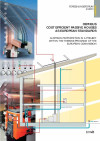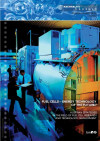Suchergebnisse
Energy Efficient University Buildings

Potentials, measures and perspectives at Austrian universities
Forschungsforum
3/1999
Herausgeber: BMVIT
Englisch, 6 Seiten
Downloads zur Publikation
Integration methods for solar heat into industrial production processes
The project aims at the development of integration methods for solar heat into industrial production process with batch operations as typical for SMEs
Einfach:wohnen, integrated concept for multi-storey residential buildings
The aim of the project is to create a base for future social residential housing projects, for further projects and the development of standards in the field of passive and low energy houses.
green LIGHT: light, fresh air, exterior space, greening in the large volume PassivHaus

theoretical topics: Optimization of natural light, ambient humidity and of private exterior space, planted over buildings, evaluation of the energetic performance and special challenges of large volume "Passivhaus" residential buildings. applied research: concept for the renovation of a 13 storey residential building for senior citizens built in 1974 to PassivHaus standards, applying the results attained in the theoretical part.
IEA HPP Annex 33: Compact heat exchangers for heat pumping equipment
International cooperation aiming at widening the use of compact heat exchangers in heat pumping equipment. The goal of this project is to identify compact heat exchangers, either existing or under development, that may be applied in heat pumping equipment such as compression or absorption heat pumps.
Wood-processing employing a superimposition of ultrasonic vibrations
Development of wood-processing techniques employing high-frequency ultrasonic vibrations in terms of applications in the woodworking industry.
Production of bioethanol in addition with heat, power and valuable byproducts
The production of bioethanol in Bruck/Leitha in addition to the production of heat, power and valuable by-products from biomass will be optimized by a new process simulation tool under the target of maximum usage of waste and low temperature heat and optimal source and product usage.
Development of thermal solar systems with unproblematic stagnation behaviour
Research on the influence of collector hydraulics, piping and the arrangement of plant components on the stagnation behaviour of thermal solar systems.
Pathways to sustainable construction. Experiences and prospective European research strategies

The aim of this study is to investigate the international research context of the programme "Building of Tomorrow" (with a focus on central, eastern and southern European countries) and to identify co-operation potentials.
ZSG - Sustainable Concepts in urban redevelopment and building refurbishment

Project on research and implementation for ecological and energy efficient concepts, urban redevelopment and building refurbishment. Performance of a routing project on a former ter-ritory of the Austrian armed forces in Steyr.
Indicators of social sustainability for energy regions of the future (SONAH)
Set of social sustainability indicators, oriented at practice needs, and concept for their use in energy strategy processes, regional energy concepts, planning and operation of plants generating renewable energy
Cepheus Cost Efficient Passive Houses As European Standards

Austrian participation in a project within the Thermie-progra of the European Comission
Forschungsforum
2/2001
Herausgeber: BMVIT
Englisch, 6 Seiten
Downloads zur Publikation
Waste heat utilisation and use of renewable energy sources in a metal-working enterprise
Use of waste heat and covering of the remaining energy demand by the renewable energy sources hydropower and biomass in a metal-processing company.
Application of the Stirling cycle for environmentally compatible cooling - systems analysis
Conventional cooling has adverse effects on environment (eg. ozone depletion, global warming). One option for environmentally compatible cooling systems for near ambient temperatures (-10 to -50°C) is the Stirling cooler with environmental friendly process.
Potential For Electricity Saving In Buildings

Models for the efficient use of energy in different types of buildings and areas of application in Vorarlberg, Austria
Forschungsforum
3/1996
Herausgeber: BMVIT
Englisch, 6 Seiten
Existing building reconstruction and implementation of passive house components

Implementation of passive house components, systems and techniques into the practice of existing building reconstruction, in order to reduce the energy consumption as much as possible and to increase the living quality substantially. Craftspeople and planners, who are specialized in building renovation, should gain access to passive house know-how.
Green Biorefinery - Separation of Lactic Acid from Grass Silage Juice (Brown Juice)
Development of a technical process to separate lactic acid from Brown Juice. Lactic acid is a promising chemical commodity which may be produced from silage juice at low costs and in an environmentally friendly way for subsequent synthesis of valuable products.
User-friendly heating and ventilation systems for low energy and passivehouses

The goal of the research project is the evaluation of different heating and ventilation systems for passive- and low energy multi family and office buildings taking into account indoor climate, possible variation of user behaviour, final and primary energy demand, costs, space demand and fail save installation and operation.
New Conceptions for elderly people in new construction and renewal

Development of a catalogue of criteria for senior-housing and detailed implementation plans of a new building and/or of a reorganization project in Vienna, located in the 16th district; Costs and comparison analysis between "ordinary" New building and/or "ordinary" Reorganization and senior-housing new buildings and/or renewal
Fuel Cells -Energy Technology Of The Future?

Austrian Strategies in the Field of Fuel Cell Research and Technology Development
Forschungsforum
3/2002
Herausgeber: BMVIT
Englisch, 6 Seiten
